Artificial Intelligence Revolution: Latest Trends
Stay ahead with the top AI trends in 2024. Discover the latest advancements and insights shaping the future of artificial intelligence.
ARTIFICIAL INTELLIGENCE AND ITS FUTURE
Sudipta Nath
6/27/2024
Artificial Intelligence Trends: The Revolution Continues
Artificial Intelligence which works like the human brain continues to evolve at a rapid pace, influencing various sectors and transforming the way we interact with technology. As we move into 2024, several key AI trends are emerging that promise to shape the future and problem-solving ability. Here’s an in-depth look at the top AI trends you need to be aware of this year, including the impact of big data. In a world where managing multiple interests can often feel overwhelming, Artificial Intelligence emerges as a beacon of hope, offering innovative solutions to streamline our lives and ensure we stay motivated. As we delve into 2024, the evolution of Artificial Intelligence shows no signs of slowing down. The landscape is ripe with exciting trends that are set to redefine the future of technology and human interaction. Let's embark on a journey to explore the forefront of these trends to enjoy the AI capabilities that hold the potential to revolutionize our lives this year. Navigating the Complexities: How Artificial Intelligence Can Help You Manage Multifaceted Interests?
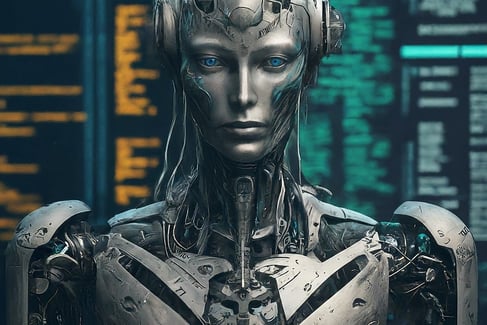

History of AI (1950s and 1970s)
The roots of artificial intelligence trace back to the 1950s, a time when science fiction writers like Marvin Minsky and John McCarthy envisioned intelligent machines. Artificial Intelligence has a fascinating history, dating back to the 1950s when pioneers like Alan Turing laid the groundwork for modern Artificial Intelligence. Over the decades, advancements in computing power and algorithms have propelled Artificial Intelligence into various applications, from robotics to natural language processing (NLP). Early research in the 1950s focused on problem-solving and symbolic methods. The 1970s saw a surge in AI research, leading to the development of expert systems. The late 20th century and early 21st century witnessed significant breakthroughs in machine learning, neural networks, and deep learning. Today, it is an integral part of everyday technology, powering personal assistants, autonomous vehicles, and advanced analytics. As we delve into the history of Artificial Intelligence, it becomes evident that its roots run deep, tracing back to the visionary work of pioneers like Alan Turing in the 1950s. Turing's seminal work, "Computing Machinery and Intelligence," published in 1950, sparked the conversation around its potential. The evolution of Artificial Intelligence has been nothing short of remarkable, fueled by advancements in computing power and innovative algorithms.
From its early days focusing on problem-solving and symbolic methods to the development of expert systems in the 1970s, Artificial Intelligence has constantly pushed boundaries. The emergence of machine learning (ML), neural networks, and deep learning in the late 20th century marked a turning point, propelling AI into mainstream applications. Today, Artificial Intelligence stands at the forefront of technological innovation, offering a myriad of possibilities to enhance our lives. Its evolution from the foundational work of visionaries like Alan Turing in the 1950s to the modern-day applications in personal assistants and autonomous vehicles showcases a journey marked by relentless progress and ingenuity. As we embrace AI not merely as a tool but as a companion in our quest for fulfillment and success, we unlock a world where technology seamlessly intertwines with our multitudes of interests, guiding us towards a harmonious balance without overwhelming us. In this digital age, AI serves as a testament to the remarkable surges in its capabilities, paving the way for a future where autonomous vehicles (self-driving cars), connected devices, and even brain-controlled robotic arms are possible.
1. Generative AI and Problem-solving
Generative AI remains a hot topic in 2024. This technology is capable of creating text, images, music, and even video content that is almost indistinguishable from human-made creations. You can find so many examples on Google and YouTube. Tools like OpenAI's GPT-4 (https://openai.com/) and DALL-E (https://openart.ai/) are leading the way in generative AI applications, being utilized in industries ranging from marketing to product design.
Applications and Impact:
Marketing: Personalized content creation. In the realm of Artificial Intelligence, the concept of generative AI continues to captivate minds in 2024. Innovations like OpenAI's GPT-4 and DALL-E have pushed boundaries, enabling the creation of content that blurs the line between human and machine. This technology finds its applications across diverse sectors, from marketing strategies to cutting-edge product design. Moreover, AI-powered personalization stands at the forefront of revolutionizing user experiences.
Product Design: AI-generated prototypes and designs. In the realm of Artificial Intelligence, 2024 continues to witness astounding advancements in generative AI technology. Tools have set new standards in content creation, seamlessly blending human-like creativity with machine efficiency. This fusion of artistry and precision has reshaped industries, from marketing strategies that engage audiences on a personal level to product design that pushes the boundaries of innovation. AI-powered personalization has emerged as a game-changer, offering tailored experiences that cater to individual interests and needs with unparalleled accuracy.
Entertainment: Creation of music and art. In the realm of Artificial Intelligence, 2024 continues to showcase remarkable progress in generative AI technologies transforming content creation, blurring the boundaries between human creativity and machine efficiency. This convergence has revolutionized various sectors, from personalized marketing strategies to cutting-edge product design. It can be also trained to play games like chess and it is sure that in the future the model will challenge the world chess champion.
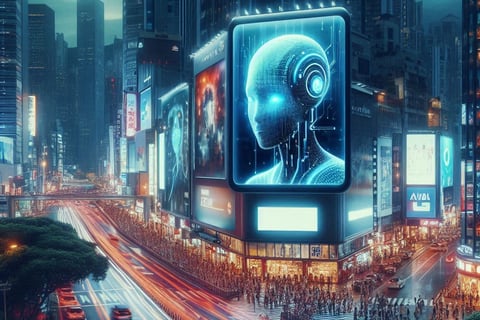

2. Ethical AI
With the increasing integration of computer science and Artificial Intelligence into our daily lives, the importance of ethical considerations cannot be overstated. 2024 sees a growing emphasis on developing systems that prioritize transparency, accountability, and fairness. Ethical AI frameworks are being implemented to ensure that algorithms make decisions just and unbiasedly.
Impact:
Fair Decision-Making: Reduced bias in hiring processes and judicial systems. The integration of Artificial Intelligence in our daily lives has brought forth a revolutionary shift, marking 2024 as a pivotal year for technological advancements. Ethical considerations are now at the forefront, with a focus on transparency, accountability, and fairness in systems. This emphasis on ethics is crucial in ensuring that algorithms make unbiased decisions, thus leading to fair decision-making processes in various realms such as hiring and judicial systems. As Artificial Intelligence continues to evolve, it not only enhances user experiences through personalized recommendations but also sparks innovation in content creation and product design.
Data Privacy: Protection of user data and prevention of misuse. In 2024, the realm of Artificial Intelligence ushers in a new era of personalization and innovation. AI-powered tools now cater to individual interests with unparalleled precision, offering tailored experiences that resonate with users on a profound level.
Empowering Users: Providing clear explanations for AI-generated outcomes and simulations. As 2024 unfolds, the realm of Artificial Intelligence continues to shape our world in profound ways. The focus on ethics within AI systems stands as a cornerstone, emphasizing transparency and fairness to drive unbiased decision-making processes. This commitment is crucial, particularly in areas like hiring and legal systems, where AI's influence is increasingly felt.
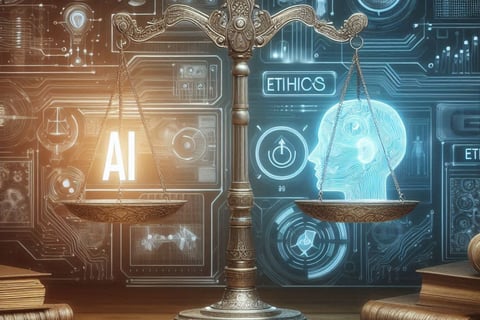

3. Multimodal AI
Multimodal AI integrates multiple new data types such as text, images, and speech, enabling more comprehensive and contextually relevant responses like speech recognition. This trend is enhancing user interactions across various platforms, making AI more intuitive and effective. As we delve into the realm of Artificial Intelligence, one cannot overlook the transformative impact it holds in shaping our future. The top AI trends of 2024 shed light on the remarkable advancements driving innovation and change across industries. In 2024, Artificial Intelligence stands at the forefront of facilitating fair decision-making practices and promoting transparency in various sectors. The evolution of AI has significantly reduced biases in hiring procedures and legal systems, ensuring accountability and equity.
Applications and Impact:
Customer Service: More personalized and effective interactions. As we delve into the realm of Artificial Intelligence in 2024, the landscape is abuzz with transformative developments catering to a multitude of interests. Generative AI stands at the forefront, showcasing its prowess in crafting text, images, music, and videos that rival human creations. Tools like GPT-4 and DALL-E are paving the way for personalized content creation in marketing, innovative product design prototypes, and the artistic expression found in music and art. Moreover, the ethical considerations surrounding it have garnered significant attention this year. The emphasis on transparency, accountability, and fairness underscores a pivotal shift towards responsible
Healthcare: Improved diagnostics through integrated data analysis. In the realm of Artificial Intelligence, a beacon of hope shines through as it navigates the complex landscape of managing multiple interests without succumbing to overwhelm. The evolution of Artificial Intelligence has brought about fair decision-making practices, fostering transparency across various sectors. Biases in hiring and legal systems have been notably reduced, championing accountability and equity.
Education: Enhanced learning tools using diverse data inputs. In 2024, Artificial Intelligence continues to revolutionize various aspects of our lives, offering a beacon of hope in managing multiple interests without feeling overwhelmed. The advancements in Generative AI, exemplified by GPT-4 and DALL-E, are reshaping content creation across marketing, design, music, and art. Moreover, the focus on ethical considerations underscores a shift towards responsible AI practices, ensuring transparency and fairness in decision-making processes. As AI evolves, it brings about improved diagnostics in healthcare, reduces biases in hiring and legal systems, and empowers individuals with clear explanations of AI-generated outcomes.
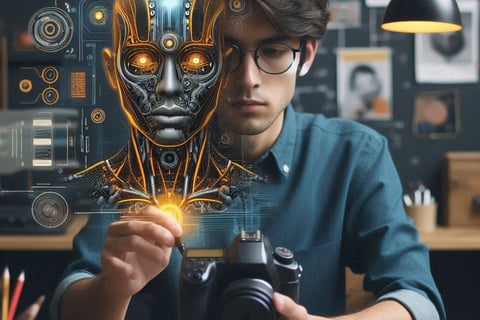

4. AI in Software Engineering, Computing and Cybersecurity
AI is transforming software engineering with the advent of prompt engineering. This involves designing prompts to guide AI models like ChatGPT to produce specific outputs, which is becoming an essential skill for developers. The evolution of Artificial Intelligence has indeed revolutionized various sectors, from fair decision-making practices to enhanced learning tools. As we delve further into 2024, it continues to shine as a beacon of hope in managing multiple interests without succumbing to overwhelm. The transformative trend of multimodal AI integrating text, images, and speech data paves the way for a more holistic human-machine collaboration experience in the field of AI.
Applications and Impact:
Development: Artificial intelligence, exemplified by advanced models like GPT-4 and DALL-E, is a powerful tool reshaping various industries such as marketing, design, music, and art. Beyond just revolutionizing content creation, AI is paving the way for ethical practices that prioritize transparency and fairness in decision-making processes. This shift towards responsible AI is evident in sectors like healthcare, hiring, and legal systems. In software engineering, AI is driving innovations through prompt engineering, where developers design prompts to guide models like ChatGPT for specific outputs. This trend is transforming how developers approach their work, enabling them
Productivity: Automated repetitive tasks, reducing errors. Productivity has surged to new heights with the integration of Artificial Intelligence (AI) into various aspects of our daily lives. By automating repetitive tasks and minimizing errors, AI has become a cornerstone in enhancing efficiency and effectiveness across industries. From AI-assisted coding and debugging to streamlining workflows, the impact of AI on productivity cannot be overstated. As we navigate through this era of technological advancement, embracing AI as a catalyst for progress is essential for maximizing our potential and managing multiple interests without feeling overwhelmed. Let us harness the power of AI to propel us toward a future where productivity knows no bounds.
Innovation: Faster development cycles and innovation. Innovation: Faster development cycles and innovation are being propelled by the integration of Artificial Intelligence (AI) into various industries. With AI streamlining processes and offering insights, developers can iterate more quickly, leading to faster development cycles and cutting-edge innovations. This symbiotic relationship between humans and AI is revolutionizing how we approach problem-solving and creativity, pushing boundaries beyond what was once thought possible.
cybersecurity: Artificial intelligence is reshaping the cybersecurity landscape, providing a formidable defense against evolving threats. AI-powered systems leverage machine learning algorithms to continuously analyze vast amounts of data, enabling real-time threat detection that surpasses traditional methods reliant on known signatures. This proactive approach allows for early identification of subtle anomalies and suspicious activities that may indicate a potential cyberattack, enabling swift response and mitigation. Additionally, AI's automation capabilities enable rapid and efficient incident response, automating tasks like isolating infected systems and deploying countermeasures, freeing up human security teams to focus on strategic decision-making. Moreover, AI is instrumental in enhancing data protection by developing stronger encryption algorithms, identifying vulnerabilities, and preventing unauthorized access attempts, ultimately safeguarding sensitive information and ensuring compliance with privacy regulations.
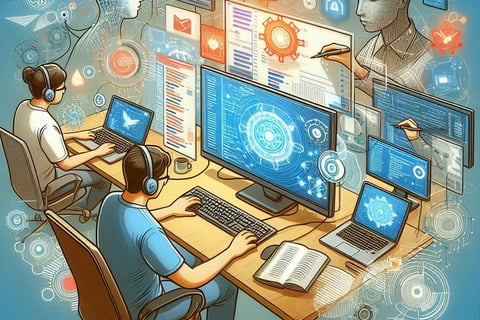

5. Industrialization of Data Science
The industrialization of data science is shifting from artisanal methods to more automated and scalable processes. This trend includes the use of MLOps (Machine Learning Operations) to monitor and maintain AI models efficiently. With the rapid advancement in Artificial Intelligence, the imperative need for ethical development practices is gaining prominence. Organizations are diligently laying down guidelines that prioritize transparency, accountability, and fairness within AI systems. This commitment not only ensures responsible technology use but also cultivates trust among users, forging a path toward a sustainable and inclusive future.
Applications and Impact:
Efficiency: Streamlined data science workflows. In the realm of Artificial Intelligence, ethics serves as the compass guiding innovation towards a sustainable future. Organizations are championing transparency, accountability, and fairness to cultivate trust among users, essential for the responsible deployment of Artificial Intelligence technology. By prioritizing bias prevention, we pave the path for unbiased Machine Learning models that uphold societal values and deliver equitable outcomes.
Scalability: Easier deployment and management of models. Seamless integration of AI innovations into various domains hinges on establishing clear frameworks that prioritize transparency and accountability. By championing ethical AI practices, organizations pave the way for unbiased models that align with societal values, fostering trust and ensuring equitable outcomes.
Accessibility: Broader participation in data science through automation. As we delve deeper into the realm of Artificial Intelligence, the focus on managing multiple interests and avoiding overwhelm becomes paramount. With a motivational compass guiding us, organizations are championing transparency and fairness to build trust essential for responsible AI deployment.
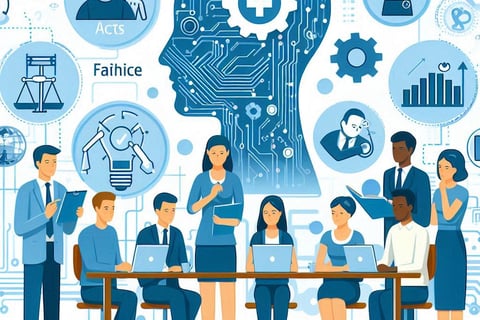

6. AI in Robotics
AI and robotics have been interlinked for years, but 2024 will see even deeper integration. AI-driven robots are now more adaptive and capable of learning from their environments, making them invaluable in sectors like manufacturing, healthcare, and logistics. As the evolution of Artificial Intelligence continues, the integration of this in robotics is set to reach new heights by 2024. AI-driven robots are becoming increasingly adaptive and proficient at learning from their surroundings, revolutionizing industries such as manufacturing, healthcare, and logistics. This deeper integration not only enhances efficiency but also opens up new possibilities for innovation and growth. In this era of rapid technological advancement, managing multiple interests and preventing overwhelm is crucial. The automation of data science through processes like MLOps is democratizing access to this technology, allowing for broader participation and equitable outcomes.
Applications and Impact:
Manufacturing: Enhanced automation and precision. The intertwining of AI and robotics is propelling us toward a future where innovation and efficiency collide. By 2024, we are witnessing a transformation where robots are not just tools but adaptive partners in sectors such as manufacturing, healthcare, and logistics. This evolution signifies a shift towards unparalleled automation and precision in industries, heralding new possibilities for growth and advancement. As we navigate this era of rapid technological progress, ensuring equitable outcomes and managing diverse interests becomes imperative. Through the democratization of AI via processes like MLOps, we are fostering a landscape where transparency and fairness pave the way.
Healthcare: Assistance in surgeries and patient care. Artificial Intelligence is revolutionizing healthcare by providing invaluable assistance in surgeries and patient care. Intelligent systems powered by AI enhance precision, efficiency, and safety in medical procedures with advanced computer programs. AI-driven robots, equipped with advanced computer vision and supervised learning algorithms, are assisting surgeons in performing minimally invasive surgeries with higher accuracy. These robots can analyze real-time data sets from imaging technologies, providing surgeons with enhanced visibility and control. For example, narrow AI applications are being used in robotic-assisted surgeries where algorithms help in identifying critical structures, reducing the risk of human error.
Logistics: Efficient sorting and delivery systems. AI-powered systems are also enhancing warehouse operations. Intelligent systems using data sets from previous transactions can predict demand and manage inventory more efficiently. By leveraging supervised learning and unsupervised learning, these systems can adapt to changing conditions and continuously improve their performance.


7. AI-Driven Personal Assistants
AI-powered personal assistants like Siri and Alexa are no longer just novelties; they're evolving into indispensable companions for our digital lives. These virtual assistants, driven by sophisticated machine learning and natural language processing algorithms, are capable of understanding and responding to our commands with increasing accuracy and nuance. This allows them to tailor recommendations to our individual preferences, whether it's suggesting a new song we might enjoy or helping us plan our daily schedule more efficiently.
Applications and Impact:
Personalized Assistance: The integration of AI-driven personal assistants into our homes is transforming the way we interact with our living spaces. Through voice commands or simple taps on our smartphones, we can control our smart home devices, adjust the thermostat, dim the lights, or even start the coffee maker before we get out of bed. This level of automation not only adds convenience but also opens up new possibilities for energy efficiency and home security.
Home Automation: In the realm of productivity, AI-powered personal assistants are proving to be valuable allies. They can manage our calendars, set reminders, create to-do lists, and even draft emails, freeing up our mental energy for more creative and strategic tasks. By learning our habits and preferences, these assistants can anticipate our needs and proactively offer suggestions, helping us stay organized and focused throughout the day.
Productivity: The potential for AI-powered personal assistants goes beyond just managing our daily lives. As these technologies continue to advance, they could become even more personalized and integrated into our routines, acting as virtual confidants, advisors, and even therapists. They could offer personalized learning experiences, monitor our health and well-being, and even provide emotional support. While there are ethical and privacy considerations to address, the potential for AI-driven personal assistants to enhance our lives is immense, and we're only just beginning to scratch the surface.


8. Superintelligence Reasoning and AGI
While still a theoretical concept, the pursuit of Artificial General Intelligence (AGI) and superintelligence represents a frontier in AI research and development. AGI aims to create AI systems that not only excel at specific tasks but possess the broad cognitive abilities of humans, including reasoning, problem-solving, learning, and understanding complex concepts. This ambitious goal has spurred groundbreaking research into the nature of human intelligence and how it can be replicated in machines.
Applications and Impact:
Research and Development: The applications and impact of AGI, if achieved, would be far-reaching. In the realm of research and development, AGI could lead to significant advancements in our understanding of human cognition, potentially unlocking new insights into how our brains work and paving the way for breakthroughs in fields like neuroscience and psychology. AGI could also revolutionize scientific discovery by analyzing vast amounts of data, generating hypotheses, and conducting experiments at a pace and scale far beyond human capabilities. Beyond research, AGI could transform various industries and aspects of our lives. In healthcare, AGI could diagnose diseases, develop personalized treatment plans, and even accelerate drug discovery. In education, AGI could provide personalized tutoring, adapting to each student's learning style and pace. In the realm of business, AGI could analyze market trends, optimize operations, and even develop innovative products and services.
However, the development of AGI and superintelligence also raises ethical concerns and potential risks. Questions about control, safety, and the impact on employment, the internet, and society need to be carefully considered. As research progresses, it's crucial to establish ethical guidelines and robust governance frameworks to ensure that AGI is developed and used responsibly, ultimately benefiting humanity as a whole.


Conclusion
The AI landscape in 2024 is marked by significant advancements that are transforming various industries. Staying updated on these trends is crucial for leveraging AI's full potential. As generative AI, multimodal models, AI ethics, and the industrialization of data science continue to evolve, they promise to bring about revolutionary changes in technology and beyond. Embrace the AI revolution and unlock the potential to thrive in a world where technology is not just a tool but a companion in your journey toward fulfillment and success. As we embrace the advancements in artificial intelligence that are reshaping how we manage our interests and avoid overwhelm, it becomes imperative to also consider the ethical implications of superintelligent AI. The evolving landscape of AI requires us to strike a delicate balance between innovation and ethical responsibility. By navigating this path with vigilance and foresight, we can ensure that AI serves humanity's best interests.
How will Artificial Intelligence affect our jobs?
Artificial intelligence is revolutionizing various fields, from cybersecurity to personal assistance. While AI promises advancements in AGI and superintelligence, ethical considerations and job market impact remain crucial concerns. AI offers a beacon of hope for navigating complexities, yet its responsible development is essential to maximize its positive impact on society.
Will AI surpass human intelligence?
The concept of a technological singularity, where it surpasses human intelligence and triggers rapid, uncontrollable technological growth, is a topic of much debate. While some experts believe it's a possibility, others argue that it's unlikely or far off in the future. The current state of AI is largely focused on narrow AI, which excels at specific tasks but lacks the general intelligence and understanding of humans. Achieving artificial general intelligence (AGI), a level of AI that matches or surpasses human cognitive abilities remains a significant challenge. Even if AGI is achieved, it doesn't necessarily guarantee a singularity. The development of superintelligent AI would likely be a gradual process, with ample opportunity for human intervention and control. However, it's crucial to address potential risks and ensure responsible AI development to mitigate any negative consequences.
How will AI impact our privacy?
It can collect and analyze vast amounts of personal data, raising concerns about privacy and surveillance. Strong regulations and ethical AI practices are essential.
Will AI be used for good or evil?
Like any technology, this can be used for both good and evil. It's crucial to develop and use this technology responsibly, with ethical guidelines and oversight.
https://doi.org/10.1016%2Fj.joi.2011.06.002
https://doi.org/10.1007%2Fs10676-007-9138-2
https://www.wired.co.uk/article/artificial-intelligence-medicine-machine-vision
https://www.wired.co.uk/article/simpsons-deepfake-voice-actors-ai
